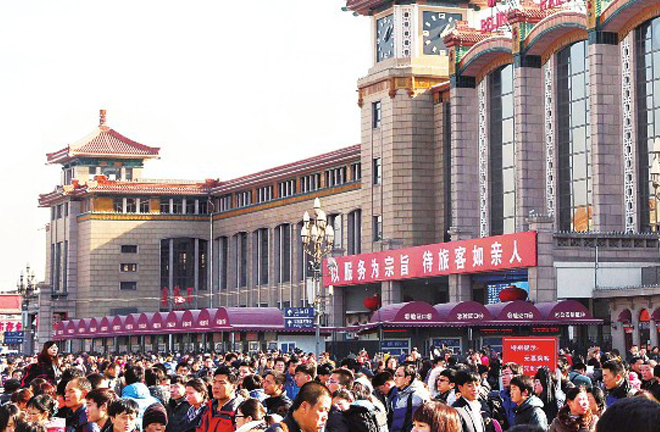Space-time sociology flourishes in unique Chinese societal context

The large-scale population flow within China creates room for the development of space-time sociology. Photo: FILE
The sociology of space and time has developed very rapidly since its introduction into China at the end of the 20th century. It has carried out extensive research empirically and theoretically and aroused continuous attention from academic circles. As a branch of sociology, space-time sociology studies social structures and processes from a spatial and temporal perspective.
Jing Tiankui, a Member of the Chinese Academy of Social Sciences and a research fellow at the Institute of Sociology, said that the development of space-time sociology in China is flourishing because of its unique advantages in Chinese society. Since the reform and opening up, the most distinctive feature of China’s social development has been in spatial and temporal characteristics. In terms of time, unlike dualistic structures in the West, China’s social transformation faces a collision of tradition, modernity and post-modernity. These three are highly compressed within the time and space of contemporary China. This ternary structure is also the greatest advantage of the development of space-time sociology in China. In terms of space, China has a vast territory with a large-scale population flowing from the central and western regions to the southeastern coastal areas. The acceleration of social mobility and the transformation of social structure provide unlimited opportunities for the development of space-time sociology.
Wen Jun, dean of the School of Social Development at the East China Normal University, said that since the 1970s, the spatial dimension has received growing attention in Western sociology and that sociological research has seen a turn toward space. With this change in international sociological research, China’s space-time sociology has also entered a period of rapid development.
Gao Herong, a professor at the School of Public Affairs at Xiamen University, said that the change toward space-time sociology research was first reflected in the transition from translating and introducing Western works to independently developing Chinese space-time sociology. We are trying to build China’s own concept and theoretical system within space-time sociology. Space-time sociology is changing from focusing on the West to China’s own issues. Furthermore, it is changing from summarizing the spatial and temporal characteristics of traditional society to summarizing those of modern society. Finally, research methods are changing from the previous logical deduction and theoretical synthesis to the combination of qualitative and quantitative study.
He Jian, an associate professor at the School of Culture and Social Development Studies at Southwest University, said that in recent years, the focus points of research on space-time sociology have shifted from incomplete studies to comprehensive ones. The field is paying increasing attention to the historical destiny of Chinese civilization and to social performances in different time periods.
As for the prospects of space-time sociology, it must be closely integrated with national major development strategies. The construction of the Belt and Road initiative, economic transformation and upgrading and the building of a prosperous society in an all-round way all involve issues of time and space. These rich social practices promise bright prospects for Chinese scholars, Jing said.
Jing added that the development of space-time sociology also faces some challenges. As a new and rising subject, space-time sociology needs to absorb a large amount of new theoretical knowledge, strengthen its reserve of current knowledge and perfect its system of knowledge. In addition, sociological research can’t do without data support. The insufficient relevant statistical data disclosure and building of database platforms has become a bottleneck for further development.
Liu Shaojie, a professor at the School of Sociology and Population Studies at Renmin University of China, said the spatial and temporal features in Chinese society display increasingly complex changes, raising many major issues for study. The current changes in the space-time perspective of Chinese society are manifested in the retrospective, extensible and anticipatory natures of traditional, modern and future times. The perspective presents a synthesis of changes in geographical, social, cyber and psychological spaces. Being intertwined in particular with the issues of social differentiation, unbalanced development and network informatization, the spatial and temporal changes in Chinese society are more complicated. This makes space-time sociology research more arduous. However, it also provides important opportunities for the development of and theoretical innovation in Chinese space-time sociology.
